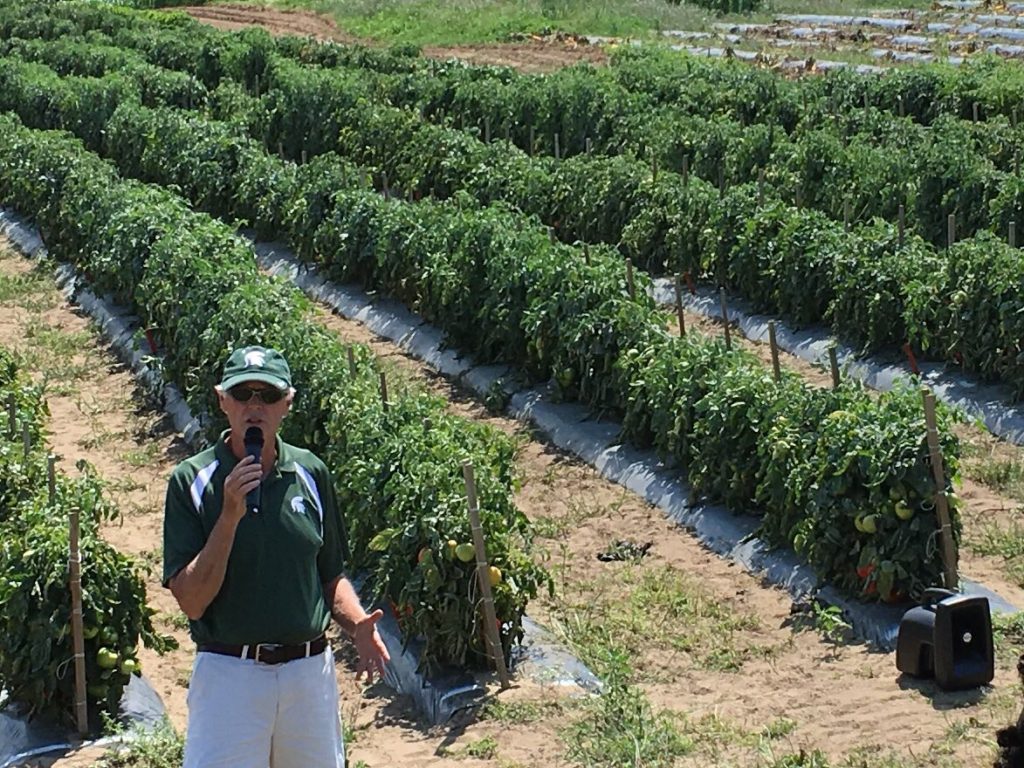

Sep 12, 2017Tomato trials, organic N options shown at field day
Educators and researchers showed off trials of new seeds and cultivation techniques at the Michigan State University’s (MSU) Southwest Michigan Research and Extension Center (SWMREC) near Benton Harbor.
About 40 individuals attended the tours at the mid-August event that included presentations on projects affecting a wide variety of crops from cucumbers and tomatoes to hops, blueberries and peaches.


MSU Assistant Professor of Horticulture Zachary Hayden spoke about testing different organic sources of nitrogen on a cucumber plot. Some of the commercial materials available are based on dried pork blood meal, soybean meal and fish emulsions, he said.
“Nitrogen is always a challenge in organic production,” he said. “Organic forms of nitrogen have low N availability. … It is released more slowly than your synthetic fertilizers. It also tends to be more expensive.” The products also can low-soluble, with a large amount of water required for fertigation. All of these factors are reasons to conserve fertilizer, but leaching events can drain N from the soil, so it may be best to protect the soil with black plastic.
Tomato trials
MSU Extension Educator Ronald Goldy spoke on his work on various trials of vegetable varieties for tomatoes, russet potatoes, Harris Moran Zucchini, pickle cucumbers, slicing cucumbers and russet potatoes. Goldy’s major trial for 2017 is tomatoes. Ten saladette, or Roma, varieties and 18 fresh-market varieties will be evaluated for size, total yield and appearance. Standard commercial varieties are being tested alongside numbered selections from seven seed companies. “Some of these are one step away from being named,” he said. The results from the trials will be finished in November and published in the Midwest Vegetable Variety Trial Report.
Tomatoes often hang at the right level from the ground for crows to reach, and if pecked will rot. Currently, the tomato patch is shielded from crows by streamers, but Goldy said in the past used dead crows to keep the others away. Each dead crow takes keeps about 200 feet clear. “It’s an old farmers’ trick, but it works,” he said.
Goldy is also testing new specialty crops that are transported and sold at farmers’ markets where information is gathered. This year, he’s testing Mexican sour gherkins, also known as mouse melons, which have been well-received by consumers but are slow to come into production, starting to come into production in mid-to-late July until the frost. Goldy said that some machinery tooled for cherry tomatoes could also be used with the gherkins.
“They have been well-received in the various marketplaces where we’ve tried to market them,” he said. Additional trials will focus on getting the gherkins to produce earlier in the year, and training them onto a trellis that will make them easier to pick.


Other highlights
MSU lab manager Kristin Poley discussed trials for a variety of alternative treatments for managing nematodes in the soil. One of the treatments being evaluated is Sun Hemp, a tropical legume that will grow 3-6 feet before being cut down and worked back into the soil. Other treatments included a high-rate of chicken manure, and soil “solarization” – using a spread of clear plastic that traps solar heat in the ground, killing off nematodes. Poley added that a downside to this last treatment was that helpful bacteria and microorganisms would also be killed off. Cucumbers will be planted on the trial grounds to measure their effect.
Goldy also has a trial examining whether sweet corn yields can be increased by tighter spacing of the stalks.
Above: Michigan State University Extension Educator Ronald Goldy spoke on his work on various trials of vegetable varieties. Photo: Stephen Kloosterman
Organic N
— Stephen Kloosterman, VGN Assistant Editor














